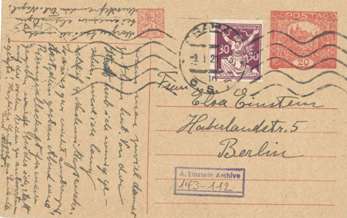| | 10 July, 2006
| | Einstein: Husband, lover and father | | New letters shed light on the scientist’s personal life |
 | | A letter from the newly released collection of Einstein correspondence (Courtesy of the Albert Einstein Archives at Hebrew University) |
|
A large collection of correspondence shedding light on Einstein's personal life and perspectives was made public today by The Albert Einstein Archives at the Hebrew University of Jerusalem.
Spanning almost 3500 pages, the correspondence encompasses letters to and from his first and second wives and children between the years 1912-1955.
This newly released batch of letters fill in details to create a ''higher resolution'' image of Einstein beyond what was previously known of his personal life. The collection has been in the Einstein Archives at the Hebrew University for many years, but was not made public in accordance with the will of Einstein’s stepdaughter, Margot, who specified that they not be revealed until 20 years after her death. Margot died in July 1986.
Einstein's wrote almost daily letters to his second wife Elsa and to her daughter Margot whilst away from home about delivering and listening to boring lectures, playing music with friends, or trying to stop smoking.
However, the most striking aspect of this correspondence is the way in which Einstein openly discusses his extramarital affairs with Elsa and Margot, and his wife's reluctant acceptance of the situation.
On his love affairs:
Despite declaring in one letter that ''I must seek in the stars what was denied to me on earth,'' it appears that while he may have sought in the stars, he did in fact find on earth. In 1923, he fell in love with a friend's young niece who had become his secretary, and he did his utmost to integrate her into his family life.
Between the mid-1920s and his emigration to the U.S., there were other women in Einstein’s personal life: a Margarete, an Estella, a Toni, an additional Toni and an Ethel shared the pleasure of sailing, reading books attending concerts, and more with Einstein.
References are made to women throughout his letters, often with the premise that they were chasing him, showering him with “unwanted” affection. A letter to his wife Elsa reads: ''Mrs. M. definitely acted according to the best Christian-Jewish ethics: 1) one should do what one enjoys and what won't harm anyone else; and 2) one should refrain from doing things one does not take delight in and which annoy another person. Because of 1) she came with me, and because of 2) she didn't tell you a word. Isn't that irreproachable?''
In a letter to his stepdaughter, Margot, in 1931, Einstein confides in her, ''It is true that Mrs. M. followed me [to England] and her chasing after me is getting out of control…''
After Elsa's death, messages Einstein wanted to be delivered to a certain Margarita – today known as Einstein's Russian spy lover – were passed though his daughter Margot's hands: ''I'm enclosing a little letter for Margarita, thus avoiding to provide curious eyes with tidbits…'' The letter to Margarita – about whom there have been earlier revelations – is not included in this collection.
The batch of letters also deal with a number of other facts of Einstein's life, including the full story of Einstein's Nobel prize money, his relationship with his son and step-daughter, and his thoughts on relativity.
On his Nobel Prize money:
Despite reports that Einstein transferred the Nobel Prize money directly to Switzerland following a divorce agreement in which it was assigned to his first wife, Mileva, these letters reveal that he instead invested the major part of it in the United States, much of which was later lost in the Depression.
On his son:
Particular attention is dedicated to Einstein's relationship with his son, Eduard. Einstein found his son's schizophrenia difficult to accept, and on more than one occasion expresses the idea that it would have been better off if Eduard had not been born.
On his step-daughter:
In a letter to Elsa in 1924, Einstein tells her, ''I love her [Margot] as much as if she were my own daughter, perhaps even more so, since who knows what kind of brat she would have become [had I fathered her].''
On relativity:
In a letter to Elsa in 1921, he admits, ''Soon I'll be fed up with the relativity. Even such a thing fades away when one is too involved with it…''
(Translations of letters, images and background information are available on request.)
|
Downloadable File: Einsteinrelease.doc |
|


